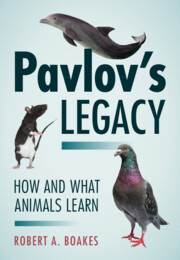Book contents
- Pavlov’s Legacy
- Pavlov’s Legacy
- Copyright page
- Contents
- Preface
- Acknowledgments
- 1 Ivan Pavlov, Conditioned Reflexes and Experimental Neuroses
- 2 Developing Habits
- 3 Learning Where Things Are and Where Events Happen
- 4 Fear, Avoidance, and Punishment
- 5 Comparative Psychology
- 6 Imprinting and Constraints on Learning
- 7 Discrimination Learning, Attention and Stimulus Generalization
- 8 B.F. Skinner and the Experimental Analysis of Behavior
- 9 How Animals Learn to Associate Events
- Notes
- References
- Index
7 - Discrimination Learning, Attention and Stimulus Generalization
Published online by Cambridge University Press: 07 October 2023
- Pavlov’s Legacy
- Pavlov’s Legacy
- Copyright page
- Contents
- Preface
- Acknowledgments
- 1 Ivan Pavlov, Conditioned Reflexes and Experimental Neuroses
- 2 Developing Habits
- 3 Learning Where Things Are and Where Events Happen
- 4 Fear, Avoidance, and Punishment
- 5 Comparative Psychology
- 6 Imprinting and Constraints on Learning
- 7 Discrimination Learning, Attention and Stimulus Generalization
- 8 B.F. Skinner and the Experimental Analysis of Behavior
- 9 How Animals Learn to Associate Events
- Notes
- References
- Index
Summary
This chapter describes how the question of how animals perceive their world led to developments in discrimination training. These studies included ones that, for example, tested whether a dog, cat, or rat could learn to discriminate between two stimuli that differed only in color. Developments in the study of discrimination learning became increasingly theoretical. For example, one important issue had to do with the possible role of attention in discrimination learning. Rejection of this possibility by the highly influential behaviorist, Kenneth Spence, led to his important continuity theory. In turn, studies of phenomena such as transfer-along-a continuum and the overtraining-reversal-effect in the 1950s and 1960s by a series of researchers, including Stuart Sutherland and Nick Mackintosh in the UK, led to a revival of interest in selective attention in discrimination learning. The final section describes studies of stimulus generalization and behavioral contrast.
Keywords
- Type
- Chapter
- Information
- Pavlov's LegacyHow and What Animals Learn, pp. 173 - 213Publisher: Cambridge University PressPrint publication year: 2023



